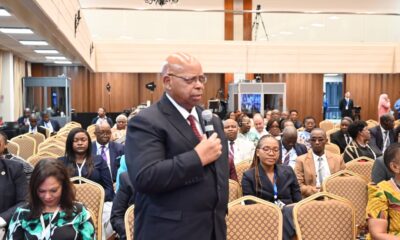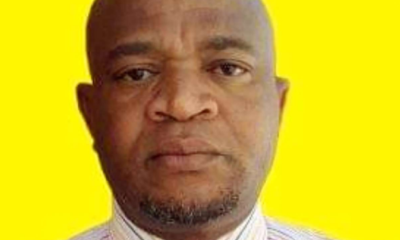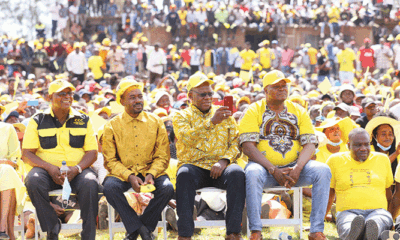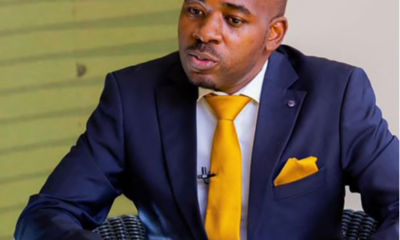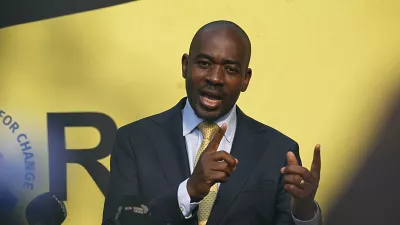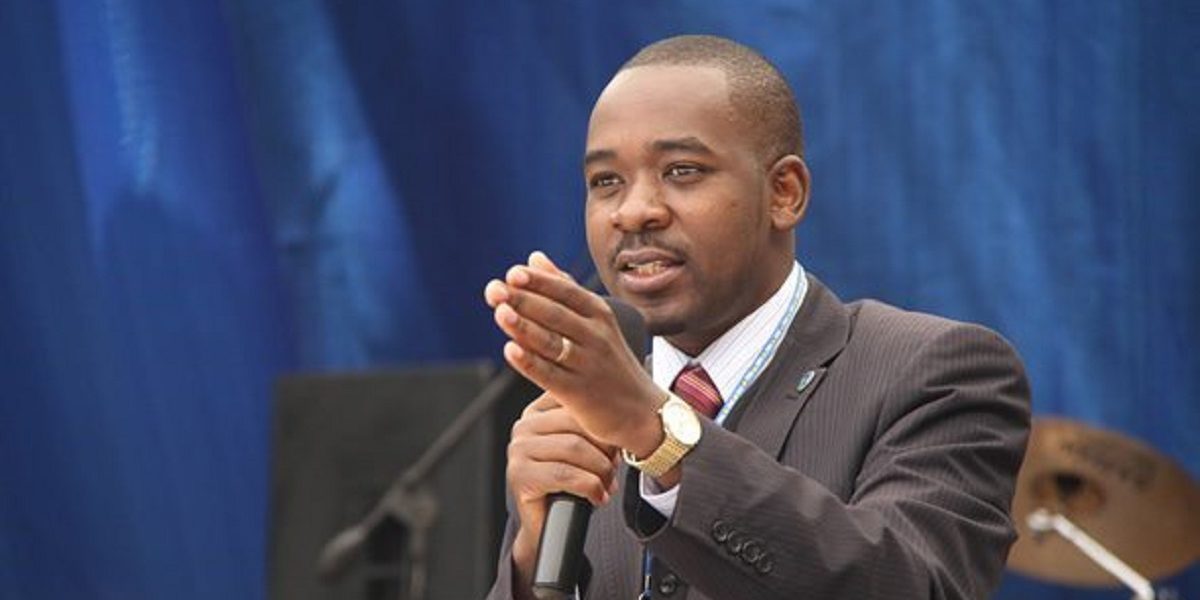
Opinion
Understanding power and accountability
Published
4 years agoon
By
NewsHawksALEX MAGAISA
POWER is a complex phenomenon. If you are seeking power or trying to hold those who hold power to account, it is important to understand the nature of power.
Many people are familiar with the power that is held by the state and, consequently, by those who control the state. The system of checks and balances built into national constitutions is often targeted at controlling this type of state power.
However, less attention is paid to power that is held by non-state actors or private actors such as corporations, religious organisations, political parties, pressure groups, and even non- governmental organisations. In this article, I argue why it is equally important to subject non-state actors to accountability mechanisms. This will ensure an expanded and more comprehensive form of constitutionalism whereby both state and non-state actors are held to account.
Repressive power
It is also important to understand the various types of power. Many people are familiar with what we may conveniently refer to as repressive power. This is a type of power that is drawn from and exercised through a vertical and hierarchical command and control structure. This type of power is repressive because it is usually accompanied by a penalty or sanctions for disobedience. Repressive power has been the dominant type of power throughout human history, usually with the few imposing their rule over the many because they have superior force.
With repressive power, the sovereign commands citizens and in turn, the citizens must obey. If they disobey, they will be punished. It is the sovereign that imposes the rules, with or without the consent of the citizens. A citizen who disobeys the rules may be arrested, tried, and jailed.
This type of power is coercive, and it is enforced by the coercive apparatus of the state such as the police, military, and prisons. The state benefits from the monopoly that it holds over the use of violence. This type of power is exercised openly to deter other citizens. For example, when citizens see political activists getting arrested and jailed, they are supposed to get scared and refrain from similar activities. The threat of force or violence is a critical element in this type of power.
Although the state is usually associated with repressive power, it is not the only one that relies on this type of power. Most entities or individuals in positions of power also make use of repressive power. It could be a boss at a company or a headmaster at a school. Where the president of a state has police to enforce his rules, the headteacher has prefects and the corporate boss has managers and security officers. A parent in the household may also use repressive power to enforce his or her leadership. The boss of a mafia gang also uses violence as an instrument of control to ensure his commands are obeyed.
There is another subtle type of power that is different from repressive power. Repressive power is based on fear of disobedience and the threat of violence. But if people lose the fear of violence they are encouraged to disobey, which places the ruling authority in a vulnerable position. It becomes very hard to control people if the only form of power that you have is coercion and the people are no longer scared of coercion.
When people revolt en masse against a dictatorship, it is because they would have overcome the fear of repressive power. At that point, the dictator realises that he does not have any other power to control his people. Many dictators find themselves vulnerable when the military and police they would have relied upon stand aside and let the people revolt. It is like a parent or teacher who uses violence to control the kids under their control. There comes a point when the kids overcome the fear of violence. At that point, with no other source of power, the parent or teacher loses control over the kids.
Besides, repressive power is expensive to maintain. You must pay police officers and soldiers that enforce repressive power. You must maintain a system of incentives so that they continue to obey you. There is always a risk that they might decide to disobey you. Many leaders have paid a heavy price for relying on repressive power.
They became so dependent on instruments of coercion that those instruments became confident of their power – that they could take the power into their own hands rather than rely on the leader. Or that they could choose their own. This is what happened to Mugabe in 2017. The military had rescued him in 2008 and he had become dependent and beholden to it. When he became a problem, it was easy for the military to remove him. This is a lesson to Mnangagwa: when you rely on repressive power, you place yourself at the risk of repressive instruments.
Consent-based power
The costs associated with repressive power explain why it is important for leaders to rely on other sources and types of power to control the population. The other types of power are based on consent. Citizens are not forced to agree to a power held by an entity of an individual. They follow the entity or individual because they consent to do so out of free will. This ability to get people to follow you is not given to everyone. There are several reasons why people grant consent either explicitly or implicitly so that others can lead them, and they follow. Such leaders do not have to command their followers to follow them.
Indeed, as you will discover, one of the consequences of this is that one does not have to be a politician to wield enormous power and control over other people. Most of the people who exercise power by consent are not politicians. As we shall soon observe, knowing that they do not have this type of power, towards elections politicians, go the extra mile to associate themselves with these individuals and non-state entities that wield a lot of power by consent over communities.
But identifying that power is held by non-state actors also has important implications for the concept of accountability. This means just as we expect politicians and state actors to be held to account, non-politicians and non-state actors must also be held to account. The risk of abuse of power does not diminish because the holder of power is a non-state actor.
Why do people consent to follow others? There are no easy answers, and a few theories might assist us.
Rational choice
First, if we apply the rational choice theory, the reasoning is that as rational individuals, whenever we are faced with a decision, we carry out a cost-benefit analysis. We weigh the costs and benefits of taking a particular decision. If the benefit of following a leader outweighs the costs, we are likely to take that choice. In a democratic society, citizens have a choice to decide which leader to follow from among several contestants. We express our consent by electing that individual.
However, where elections are not free and fair, the idea of consent is severely compromised. If there is political violence, a voter will factor in the threat of violence as a cost of voting and make a choice that is less likely to result in violence. When people wonder why individuals continue to vote for a party that is impoverishing them, it is probably because the voters have considered the threat of violence. This is a particular problem in rural areas that have experienced high levels of violence in the past. Therefore, opposition parties have to confront the issue of fear of violence because it is a cost of voting that rural voters do take into account when they make political choices.
Path dependency
Second, if we use the historical path dependency theory, it might be that people take the path that they have taken before because they are familiar with it. Humans are creatures of habit. It might not be the best path but because it is the path that has been taken before, the theory is that citizens tend to resort to that path. We might observe this many times in our personal lives, when faced with decisions people tend to go for what they are familiar with rather than exploring new paths. At the workplace, a new intern might suggest what they think is a bright idea, but the older hands will dismiss it saying this is how we have always done things here.
Applying it to leadership, citizens might give consent to what they already know not because it is the best but because it is what they have always done. Some people will vote for Zanu PF because that is what they have always done since 1980. Likewise, some people might vote for the opposition because they have always preferred the opposition. They are comfortable with the path with which they are already familiar even with its imperfections and weaknesses. Whatever the case, political parties are powerful institutions that wield control over large numbers of people. At present, the two most powerful political parties are the CCC and Zanu PF.
Tradition and culture
Sometimes consent is based on tradition and culture. Many societies that pursue the democratic path still maintain traditional authorities such as the monarchy, chiefdoms, etc. How do these societies that place such a premium value on leadership by consent still maintain institutions that are the antithesis of democracy? Kings, queens, chiefs, Lords, and headmen are unelected.
The UK House of Lords consists of unelected peers, but this is a country with some of the most robust and enduring democratic traditions. Zimbabwe’s Constitution reserves seats in the Senate for chiefs. South Africa’s Constitution also has a place for traditional leaders. This complex mix between the traditional systems of power that are based on hereditary succession and modern systems of power based on elections is based on consent. The citizens of those countries have through their constitutions consented that the unelected should have a place in their governance systems. They consent because it is part of their tradition and culture and therefore is a matter of identity.
Understanding this type of power is very important in the Zimbabwean context where traditional leaders occupy important spaces in rural communities. They command respect and obedience in the local communities. They are part of the social fabric of rural life, and nothing happens without their knowledge or authority. They are a critical part of the social and political economy of local communities. Citizens in rural communities generally submit to the authority of local traditional leaders. Therefore, political authorities, whether in the colonial or post-independence eras, have associated themselves with traditional authorities, and where traditional authorities have been difficult, they have been removed and replaced by pliable authorities.
Expertise
Power by consent can also be derived from expertise. If people think that the people they regard as experts in a field are right, they are likely to follow them. They grant their consent because they trust their expertise. We have seen during the coronavirus pandemic how scientists took on an authoritative role in political and public policy decision-making over the last couple of years. People generally consented to those decisions because they placed faith in the abilities of the experts who were recommending them. We saw how elected officials had scientific experts by their side when making important public health policy announcements. The restrictions on human rights were fortified and backed by the views of the scientific experts.
Likewise, citizens trust economists and other professionals when it comes to matters of the economy. However, this bargain between citizens and experts only works if the experts are getting it right. When they fail, the relationship breaks down and citizens withdraw their consent. People defer to lawyers in legal matters because they trust their expertise in such areas. CSOs that specialize in specific areas and acquire a reputation of expertise in those areas may also derive consent from the citizens. People can say we trust Amnesty International to speak on the death penalty because this is their area of specialism. Or we trust Greenpeace when they speak on climate change and the environment because that is what they do.
In the Zimbabwean context, people can say “we trust ZLHR in matters of human rights” because they specialize in defending human rights and human rights defenders. More recently, Pachedu has gained a stellar reputation as an elections watchdog. The way the group has publicly critiqued and challenged Zec, the elections referee, laying bare the inadequacies of the voters’ roll, has given it a great deal of credibility among the citizens, especially on the opposition end. Its output has made Pachedu a powerful and trusted watchdog in electoral matters, but its power is not based on coercion. It is based on consent because citizens trust its expertise and output. People follow Pachedu because they believe in its expertise and activism. Pachedu’s work has produced reactions from Zec. Zec knows Pachedu is having an important influence on public opinion on electoral matters.
Social media has become a key political space in recent years with individuals drawing large numbers of followers. Some of these accounts are large and highly influential. Just one tweet can have a large impact on stock markets. Their output is followed religiously by thousands of people who believe it. Their views on issues such as coronavirus vaccines attract large numbers of followers and debate. Their opinions on politics and their explanations of political events are also followed by many people who base their decisions on them. These people have not forced people to follow them. People follow them because they want to do so. It gives enormous power over these people and entities, sometimes referred to as “influencers”.
This is why politicians who think their Twitter handles are personal are grossly mistaken. Whatever they tweet on their handles is associated with their political parties. This is also why politicians and influential figures, and groups must tweet responsibly, taking greater caution to ensure that their output is accurate. Errors are bound to happen, and politicians are prone to gaffes. That’s why in such circumstances, it is important to withdraw and apologize. Some people think apologising is a weakness, but it’s a strength that reassures followers. It is particularly important to correct errors or misleading output because millions of people rely on what social media influencers produce.
Charisma
Consent-based power can also be derived from personal charisma. Citizens may choose to follow an individual because they are drawn by their impressive personal characteristics. Some characters have a unique ability to draw others into their orbit. The history of politics is replete with charismatic figures who have wielded enormous power over nations. Charisma is not synonymous with good leadership. Many of the charismatic leaders in history have used their talent to devastating effect, letting power cloud their judgment, building personality cults, and establishing dictatorships.
Zimbabwean has its fair share of charismatic leaders. Both Nkomo and Mugabe in their heyday were charismatic leaders. Nelson Chamisa who was more popular than his party in 2018 is widely regarded as a charismatic leader, a quality that eludes his opposite number in Zanu PF.
But it’s in the religious sector where we see the most charismatic leaders. The likes of Makandiwa, Magaya, Guti, leaders of mass apostolic sects fall in this category. They command huge followings which the politicians can only envy. The critical factor regarding these charismatic religious leaders is that their control is not based on repression. They have managed to gain control of the minds of the people but not through violence. Politicians would love to have this kind of power where they do not have to use violence to coerce people into obeying them.
Politicians could respond to the power of these charismatic leaders in one of two ways: ban them or associate with them. Some dictatorships have come down heavily on religious leaders for this very reason. They do not like the competition that poses in the market of public affection. However, banning is also a costly exercise. Since the following is faith-based, prohibition will only drive the activities underground, creating a black market of religious activities. Further, banning also antagonises the masses that follow the charismatic religious leaders.
This is why politicians choose the option of tolerating and associating with powerful charismatic religious leaders. When Mugabe or Tsvangirai attended apostolic sects’ gatherings it was not because they believed in the sects’ ways. They saw potential political dividends in associating with these charismatic leaders. When Mnangagwa and Chiwenga recently attended Makandiwa’s Easter gathering it was not because they had discovered a newfound love for Makandiwa’s church. It is a recognition of the power that is wielded by charismatic religious leaders with which politicians would like to be associated. Indeed, as if to counter that CCC senior leader and MP for the local area Job Sikhala also attended Makandiwa’s church service.
Holding power to account
Power can be put to good use but there is always a risk that it can be abused. That is why it is important to hold those who have the power to account. This is a key justification for the principle of accountability.
However, we usually focus on the first type of power, repressive power. When we talk about accountability, it is often directed at the government and how it exercises power. This is undoubtedly important because the government is an important site of power and the risk of abuse of power is high. We see it in the way the police or the military apply force in a heavy-handed manner. We see it when the state applies the law selectively.
However, as we have observed, repressive power is only one among various types and sources of power. There are several other sites of power, including corporations, civil society organizations, political parties, traditional authorities, churches, expert groups, pressure groups, and charismatic individuals. Most of the power in these sites is by consent: people willingly submit themselves to the authority without force or coercion.
This is a more potent type of power than repressive power which is based on command and control. You do not have to do much when people follow you because they want to. Their following is based on faith and belief, not on fear of punishment. This makes it easy to abuse. The people who are being abused might not even know or believe that they are being abused. Indeed, when the people or groups they follow are wrong, followers refuse to believe that they are wrong. If they don’t find another explanation, they will just bite their lip and pretend it did not happen. The denial is partly because people do not like anything that suggests that they are wrong.
But all this is the more reason why it is important to identify sites of power beyond the common types of power and to hold them to account. I often say to colleagues in the CSO sector that accountability is a two-way street: just as they demand accountability from the state, citizens must also demand accountability from CSOs.
The same applies to churches, traditional authorities, pressure groups, and even individuals and groups in the increasingly influential social media space. Accountability that focuses on state actors and excludes non-state actors is too narrow and misleading. Everyone who wields power must be held to account. Citizens must also not follow blindly. It does not matter that they are non-state actors. If they wield power, it is important to maintain vigilance and to hold them to account.
About the writer: Dr Alex Magaisa is a law lecturer at Kent University in the United Kingdom and former adviser to Zimbabwe’s late prime minister Morgan Tsvangirai.
You may like

